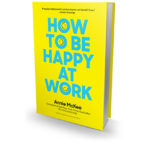By Heather O’Keefe | 01/10/2018 10:30

 In her book, How to Be Happy at Work, author Annie McKee provides a great ‘how to’ recipe for anyone who is determined to spend the majority of their working hours without being consumed by stress, drudgery, frustration, or working in a dead-end job. In fact, McKee feels that a person can be happy at work despite having some of those feelings at times. She states that happiness is a choice. Therefore, if someone wants to be happy at their job, then this book can offer some valuable insights to achieving that goal.
In her book, How to Be Happy at Work, author Annie McKee provides a great ‘how to’ recipe for anyone who is determined to spend the majority of their working hours without being consumed by stress, drudgery, frustration, or working in a dead-end job. In fact, McKee feels that a person can be happy at work despite having some of those feelings at times. She states that happiness is a choice. Therefore, if someone wants to be happy at their job, then this book can offer some valuable insights to achieving that goal.
At the end of each chapter are purposeful reflections to help analyze your own ability in the area being discussed in the chapter. It also provides mindful practice that you can implement into your daily routine to best achieve the results desired.
A few fundamental questions that need to be answered are:
- Why should one expect to be happy at work?
- Why does one need to be happy at work?
- How does one develop the persona of being happy at work?
Why should you expect to be happy at work?
Because most of your energy, focus, and resources are spent at a job for 8 or more hours a day. If you are not happy during all that time it is quite possible that the rest of your life will be impacted. What will you have left to give to yourself or your family if you are not happy for most of your waking and productive hours. If you can’t be happy most of the time then you may find your life becoming meaningless. According to Annie McKee “Happiness is a human right.”
Why is it important for you to be happy at work?
The answer to question one is part of the answer to question 2. But in addition, McKee presents powerful reasons why we need to learn to develop this attitude in order to be productive, driven, and inspiring as a team leader or team player. We need to get the most out of our time at work for our own personal benefit, which will also contribute to the success of the organization, and our longterm employment. When we are happy at what we are doing, we are engaged. It changes the way we look at what we do and why we do it. We focus on accomplishing something that has purpose for us. Why do we do what we do? What value does it have to myself or others? If the job itself has meaning and purpose then accomplishing that purpose can add meaning to our life. This applies as much to janitors as it does to CEOs.
How does a person develop the persona of being happy at work?
The answer to this question encompasses the majority of the book. McKee starts with 3 basic ingredients for being happy at work.
- Having a sense of purpose
- Having a vision and a hope
- Having positive relationships with others
Having a sense of purpose does not mean that your primary goal in life is for the organization you work for to be successful. No. Your purpose and meaning in life is bigger than that. But when you identify with your purpose and you bring that to the workplace your role at work becomes more fulfilling. You find meaning in everything you do because it contributes to your wellbeing and that of others.. So, to identify your purpose you need to know what you value in life. Then, how do your values align with you organization’s values and mission. When there is an alignment between the organization’s values and your’s, your work has greater meaning because it allows you to live and act according to your personal values. The company’s mission should inspire workers to live up to their values in life, and in most cases employees want to contribute to bigger, common goal that provides meaning and purpose, and not just a paycheck.
McKee goes on to explain that to find purpose and value in our jobs we need to be creative, innovative, find new ways of doing things better, and contributing to the overall greater good within the company and within the community. Be a person who looks for ways to improve things, not blaming others for inefficiencies or being resigned to doing things the same old way, yet sagely not upsetting the apple cart all at once.
McKee tells her experience with 2 individuals, both in high pressure and challenging jobs. The first individual felt a sense of burn out, lacking motivation to continue trying to meet deadlines and dodging the proverbial bullet. The second individual focused on the purpose and vision to be realized. She understood the value of building strong relationships with the individuals on her team. This attitude McKee attributes to the second person being able to complete her projects with success.
Having a vision and a hope is also one of the ingredients in McKee’s recipe for happiness at work. This means that we focus on how we can improve. It may be learning opportunities or advancement possibilities. Hope allows us to weather strong set backs and trials in life. In order for hope to thrive one has to banish pessimism. Allowing oneself to look at the positive things going on around us instead of the negative. This of course may be a hurdle when according to Gregg Easterbrook’s book, 2013 Chronicles, wherein he describes the world as a place where ‘negativity and pessimism rule society today’. However, having a personal hope that transcends that view is what we are trying to achieve in life.
Our relationships with others plays a major role in our being happy at work. We are social creatures by nature and we effect others either for good or bad. In order for happiness to be a fundamental attitude we need to address all the negative emotions that can work to counter our goal of being happy. McKee shows that having a strong sense of Emotional Intelligence is the key to understanding and controlling our negative emotions so that they have less impact on our overall wellbeing. In turn, the organizations we serve are positively or negatively effected by the collective emotions of their workers. For example, if you work for an organization where you are stressed to the max, afraid of your manager, or constantly upset with your colleagues, what usually happens is that you shut down or fight back. Either way, you become less effective, less happy. This is not to say that these situations wouldn’t bother most of us but it is how we react that can make the difference. Using the negative emotions we feel in positive ways such as confronting issues effectively and respectfully or analyzing how others may have felt before we react can play the biggest part in maintaining positive relationships with other which contributes to our happiness.
If we work simply because we need to make a living then we lose sight of our own values. Overwork is not sustainable and therefore is not good for us. Are we controlled by the gadget we carry in our pocket to remind us that the worries, stresses and duties are just a click away? This prevents us from focusing on the things we should be doing that have the greatest impact and contribute to the value and meaning of our job and our life.
McKee outlines in detail 5 traps that prevent happiness at work:
- The Overwork trap
- The Money trap
- The Ambition trap
- The ‘Should’ trap
- The Helpless trap
McKee uses the Emotional Intelligent model as the antidote to breaking free from the un-happiness traps. She shows us how to listen to our emotional wake-up calls. When we are physically ill we experience symptoms that we seldom ignore entirely. We need to check our emotional pulse when it comes to upsets because they effect our life just as much. Emotional wake-up calls can be:
- Seeing the glass as half-empty when normally you see it as half-full
- Seeing even small problems as insurmountable obstacles
- Feeling sad more often than normal
- Having difficulty snapping out of a bad mood
- Feeling unappreciated and taken for granted
- Feeling exhausted at the idea of doing something new and different
- Believing that no matter what you do, it won’t be enough
- Dreading your work
- Getting frustrated easily or having a short fuse
Our relationships will also suffer if we ignore other wake-up calls such as:
- Your conversations or emails are short, terse, and task oriented: “You pick up the kids and I’ll get the groceries”; or “I need the report by Friday.”
- People say things like: “Are you OK?”; “Are you mad at me?”
- You aren’t interested in getting to know your coworkers
- People in your life are distancing themselves from you
- People get quiet when you enter the room.
- You find yourself disagreeing and fighting over minor tings.
- You are prone to blame or criticize others
- You overreact when people disappoint you
- You can’t remember when you last had a good time with anyone
How to Be Happy at Work is a great read. It has particular value for those who are in positions of authority and are making decisions for their team, and who are able to impact the culture within their realm of influence. Emotional intelligence is a major factor in successful leadership today. I highly recommend it as part of a leadership program.
Connect with us if you would like to learn more about helping employees with goal setting and career planning.


 Heather is a Chartered Professional in Human Resources (CPHR), with 20 years of HR experience. She works with clients to strategically source and develop their talent by providing recruiting services, management training and performance management. Heather also consults on salary reviews, employment contracts, and the development of employment policies and workplace ethics.
Heather is a Chartered Professional in Human Resources (CPHR), with 20 years of HR experience. She works with clients to strategically source and develop their talent by providing recruiting services, management training and performance management. Heather also consults on salary reviews, employment contracts, and the development of employment policies and workplace ethics.

